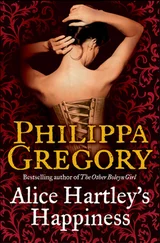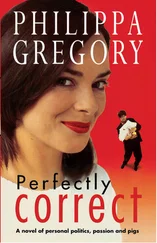But we were nearly done. The stocks were piled in the centre of the field awaiting the wagons, and the men had collapsed, gasping in the airless shade of the hedge. The women and the old people stacking the stooks were nearly finished, and the men watched their bent-backed wives and parents with lack-lustre beaten eyes, without the strength to help them.
Margery Thompson, who had been at the vicarage when John saved Richard’s life, had ceased her work already. I watched her under my eyelashes, my attention suddenly sharpened with unease. She had seated herself on the bank by the hedge and was twisting stalks of corn on her lap. It is the tradition on Wideacre that the last stook, the last one of the whole harvest, is a corn-baby, a corn-dolly. Woven by the cleverest old woman, the doll represents the leader of the harvest. Season after season I had loaned my ribbons to make the circle of magic between the harvest and me complete. I had seen a little corn-dolly Beatrice triumphant at the top of the pile of stooks. In the year Harry brought in the harvest the corn-dolly was bawdy, with a scrap of linen for its shirt and a head of wheat between the stalk legs, grotesquely erect, and everyone had roared. Harry had taken that one home, grinning, and hid it from Mama. The corn-dollies they had made for me were pinned on the wall of my office. Proof, if ever I was near forgetting, that the world of papers and debts and business was the pretend life, and the real world was the corn and the goddesses of the fertile earth.
The corn-dolly tradition had slipped from my worried, money-mad mind, but as I watched the old woman’s nimble fingers moving so cleverly and so quickly among the stalks I knew a twinge of dread warning me of some fresh disaster, that some magic against me was brewing.
The clouds had come out from hiding at last and were piling up on the horizon like great walls, blocking out the eerie sunlight and making a premature dusk. It had held off long enough to save me. As long as the wagons came safely through, and took Wideacre’s corn to the richest market in the world, the rain could pour down and wash Acre and all Wideacre into the Fenny for all I cared. I had done what I set out to do, and I cared little if the storm drowned me.
Tobermory shivered in the breeze, not because it was cold, for it carried no freshness, but it blew like the breath of a threat. It was as hot as if it blew from India with the black magic of distant dangerous places. Margery Thompson had the corn-dolly on her lap and was muttering to it as if she were nursing a baby, and chuckling to herself. The others had finished piling the stooks and were looking at her curiously. The stooks were heaped in an unstable pyramid in the middle of the field, wanting only the corn-dolly to top it off and to mark the end of the harvest.
‘There. ‘Tis done,’ she said, and tossed it high in the air. She threw it accurately and it balanced on the top of the pile. The reapers moved forward, drawn by the old tradition as if they hardly knew what they were doing, their sickles sharp in their hands.
The game was that they stood some distance from the heap and shied their sickles at it. The sickle that stuck in the dolly belonged to Bill Forrester and he walked wearily towards the stooks to claim his prize and bring it to me. But when it was in his hand he flushed scarlet to the roots of his hair and chucked it, like a football, to the man next to him. They tossed the dolly down the line and then one skilful hand, I don’t know whose, sent it whirling into the air towards me. Tobermory threw up his head in fright and I tightened one hand on the rein and caught the dolly — faster than thought, which would have warned me to let it fall.
It was not one corn-dolly but two. It was two figures coupled. It was the two-backed beast Mama had seen before the fire. A piece of grey ribbon filched from me was round the neck of one of the dollies, and a scrap of linen to indicate Harry was twisted around the other. The head of wheat that had been such a good bawdy joke four seasons ago was now obscene. The phallic sheath of corn was stuck between the other dolly’s straw legs. She was meant to be me; he was meant to be Harry. The secret was out.
Not out as gossip, I thought, shaken to stillness by this horror made from good Wideacre wheat, that seemed to stink in my hand. But out of something sensed. Something as threatening and permeating as woodsmoke. Something as indescribable yet as certain as the feel of thunder on the way. Margery Thompson, the clever old woman, had listened with her inner ear, and made a joke that hit the mark. The truth had come to her despite herself. She had not spoken it of her own free will. She had just smelled the stink of lust and incest that lingered around my skirts, that Celia feared and Mama had sensed. And she had fashioned a horror from good Wideacre wheat to show that everything was wrong.
I tore at the delicate bodies and dropped them to the ground beneath Tobermory’s hoofs.
‘You disgust me,’ I said to the thickening air over their heads. ‘You are scum. You deserve to be treated like pigs for you think like swine. The treatment you have had from me has been the best I could do. But now I shall feel nothing, nothing for you. If we are at war then well and good. I shall enclose all the common. Indeed I shall enclose and flatten Acre village itself. I shall clear my land of you altogether. And the good clean land will grow pure without your stinking cottages, and your fearful children, and your dirty minds.’
The men had hunkered down again, and only the women sighed like fir trees when the first breath of a storm moves the feathery tops. But they did not weep or call out. The baking air was draining us all, sucking the strength from us in unpredictable eddies of little hot whirlwinds.
‘Now go,’ I said. My voice was full of hate but cracked with weariness and the dryness of my tense throat. ‘Go. And when I come to the harvest dinner this afternoon remember that the man there who does not doff his cap to me and the woman who fails to curtsy is penniless, homeless, and jobless, from that moment.’
They sighed again like a forest when a woodland fire is taking hold, licking like a lover up the young saplings while the tops of the trees flutter as if to call for help.
I wheeled Tobermory round and left them in the stubble. The wagons were lumbering over the fields towards the pile of stooks and I could see John Brien in the leading cart.
‘I’m away to change,’ I said. ‘I will come down to the mill later.’
‘There may be trouble at the harvest dinner,’ he said warningly, his strange town face forever fearful on the land, sharp in this early gloaming. His face was greenish yellow from the uneasy storm light. I heard a crackle, sharp as fire, in dry bracken behind me, and his face was suddenly blazing like a white angel as the sheet lightning dropped like a shard of glass on the upper horizon of the downs.
‘There is always trouble,’ I said wearily. ‘We can always arrest some young lads. We can always hang another old man. They can start trouble but we always finish it. I have men from Chichester to guard the corn tonight and till it is threshed. And Mr Gilby will send guards with his wagons. I do not fear Acre’s spite. And tomorrow I shall speak with you about expelling them all from Acre and firing the village. I want it no more. I need it no more.’
His weasel eyes glinted at the prospect of violence to the people he despised.
‘I shall see you at the mill,’ I said. ‘Make haste to get this load into the barn. I think the rain will hold off, but when it comes it will be a great storm.’
He nodded and cracked his whip at the horses but he need not have hurried. I was right about the rain. It held off for all of my wearisome ride home when I could scarcely breathe the hot air. I felt as if someone was holding a damp muffler over my mouth and if I could have breathed I would have screamed for help.
Читать дальше
Конец ознакомительного отрывка
Купить книгу












